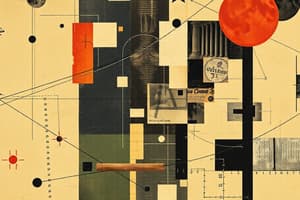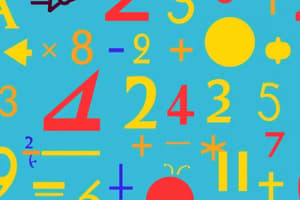Podcast
Questions and Answers
What is mathematics primarily concerned with?
What is mathematics primarily concerned with?
- The exploration of philosophical arguments
- The science and study of quantity, structure, space, and change (correct)
- Literary analysis and composition
- The study of historical events
Which of the following is the oldest and most elementary branch of mathematics?
Which of the following is the oldest and most elementary branch of mathematics?
- Geometry
- Arithmetic (correct)
- Calculus
- Algebra
What does algebra primarily use to represent numbers and quantities?
What does algebra primarily use to represent numbers and quantities?
- Sounds
- Symbols or letters (correct)
- Smells
- Colors
Which area of mathematics deals with points, lines, angles, and shapes?
Which area of mathematics deals with points, lines, angles, and shapes?
What is the primary focus of calculus?
What is the primary focus of calculus?
What does statistics primarily involve?
What does statistics primarily involve?
Which branch of mathematics deals with discrete, rather than continuous, structures?
Which branch of mathematics deals with discrete, rather than continuous, structures?
What area explores the applications of formal logic to mathematics?
What area explores the applications of formal logic to mathematics?
What is number theory mainly devoted to studying?
What is number theory mainly devoted to studying?
Which field is concerned with properties preserved under continuous deformations?
Which field is concerned with properties preserved under continuous deformations?
Which list orders operations correctly?
Which list orders operations correctly?
Which of the following is LEAST associated with Geometry?
Which of the following is LEAST associated with Geometry?
Which of the following is a key concept in Calculus?
Which of the following is a key concept in Calculus?
Which of the following is a key concept in Statistics?
Which of the following is a key concept in Statistics?
Which of the following is LEAST associated with discrete mathematics?
Which of the following is LEAST associated with discrete mathematics?
Which of the following is LEAST associated with mathematical logic?
Which of the following is LEAST associated with mathematical logic?
Which of the following is a key concept in Number Theory?
Which of the following is a key concept in Number Theory?
Which of the following is a concept studied in topology?
Which of the following is a concept studied in topology?
Which field does NOT commonly apply mathematics?
Which field does NOT commonly apply mathematics?
What is the process of using mathematical concepts to describe a system?
What is the process of using mathematical concepts to describe a system?
Flashcards
What is Mathematics?
What is Mathematics?
The science and study of quantity, structure, space, and change.
What is Arithmetic?
What is Arithmetic?
The oldest and most elementary branch of mathematics, dealing with basic operations on numbers.
Order of Operations
Order of Operations
Parentheses, Exponents, Multiplication and Division (from left to right), Addition and Subtraction (from left to right).
What is Algebra?
What is Algebra?
Signup and view all the flashcards
What is Geometry?
What is Geometry?
Signup and view all the flashcards
What is Trigonometry?
What is Trigonometry?
Signup and view all the flashcards
What is Calculus?
What is Calculus?
Signup and view all the flashcards
What is Statistics?
What is Statistics?
Signup and view all the flashcards
What is Probability?
What is Probability?
Signup and view all the flashcards
What is Discrete Math?
What is Discrete Math?
Signup and view all the flashcards
What is Number Theory?
What is Number Theory?
Signup and view all the flashcards
What is Topology?
What is Topology?
Signup and view all the flashcards
What is Mathematical Modeling?
What is Mathematical Modeling?
Signup and view all the flashcards
What is Numerical Analysis?
What is Numerical Analysis?
Signup and view all the flashcards
Study Notes
- Math is the science and study of quantity, structure, space, and change.
- Mathematicians seek out patterns, formulate new conjectures, and establish truth by rigorous deduction from appropriately chosen axioms and definitions.
Arithmetic
- Arithmetic is the oldest and most elementary branch of mathematics.
- It deals with basic operations on numbers, namely addition, subtraction, multiplication, and division.
- Arithmetic operations are performed according to a specific order of operations.
- The order of operations is Parentheses, Exponents, Multiplication and Division (from left to right), Addition and Subtraction (from left to right).
- Key concepts include: Different types of numbers (natural, integer, rational, irrational, real, complex), fractions, decimals, percentages, ratios, and proportions.
Algebra
- Algebra is a branch of mathematics that generalizes arithmetic.
- It uses symbols or letters to represent numbers and quantities in formulas and equations.
- Key concepts in algebra include: Variables, expressions, equations, inequalities, polynomials, factoring, solving equations (linear, quadratic, etc.), and graphing equations.
Geometry
- Geometry is concerned with the properties and relations of points, lines, surfaces, solids, and higher dimensional analogs.
- Euclidean geometry focuses on shapes that can be constructed using a compass and straightedge.
- Key concepts include: Points, lines, angles, planes, shapes (triangles, squares, circles, etc.), area, volume, and geometric theorems (Pythagorean theorem, etc.).
- Trigonometry is a branch of mathematics that deals with the relationships between the sides and angles of triangles.
- It is fundamental to surveying, navigation, and many branches of physics.
Calculus
- Calculus is the study of continuous change.
- It has two major branches: differential calculus and integral calculus.
- Differential calculus deals with rates of change and slopes of curves.
- Integral calculus deals with the accumulation of quantities and the areas under and between curves.
- Key concepts include: Limits, derivatives, integrals, functions, and theorems like the Fundamental Theorem of Calculus.
Statistics and Probability
- Statistics is the science of collecting, analyzing, interpreting, and presenting data.
- Probability is the measure of the likelihood that an event will occur.
- Key statistical concepts include: Data types, descriptive statistics (mean, median, mode, standard deviation), distributions, hypothesis testing, and regression analysis.
- Key probability concepts include: Events, sample spaces, probability distributions, conditional probability, and expectation.
Discrete Mathematics
- Discrete mathematics deals with mathematical structures that are fundamentally discrete rather than continuous.
- It is essential for computer science and includes topics like logic, set theory, graph theory, combinatorics, and number theory.
Mathematical Logic
- Mathematical logic is a subfield of mathematics exploring the applications of formal logic to mathematics.
- It is closely related to metamathematics, the study of mathematics itself using mathematical methods.
- Key concepts include: Propositional logic, predicate logic, proof theory, model theory, and set theory.
Number Theory
- Number theory is a branch of pure mathematics devoted primarily to the study of the integers and integer-valued functions.
- Key concepts include: Prime numbers, divisibility, congruences, Diophantine equations, and cryptography.
Topology
- Topology is concerned with the properties of space that are preserved under continuous deformations, such as stretching, twisting, crumpling, and bending.
- Key concepts include: Topological spaces, continuity, connectedness, compactness, and homotopy.
Applications of Math
- Mathematics is used in virtually every field, including science, engineering, medicine, finance, and social sciences.
- It provides tools for modeling, analyzing, and solving problems in these fields.
- Examples include: Physics (calculus for motion), computer science (discrete math for algorithms), and economics (statistics for econometrics).
- Mathematical modeling is the process of using mathematical concepts and language to describe a system.
- Numerical analysis provides algorithms for approximating solutions to mathematical problems, especially when analytical solutions are difficult or impossible to obtain.
Studying That Suits You
Use AI to generate personalized quizzes and flashcards to suit your learning preferences.




